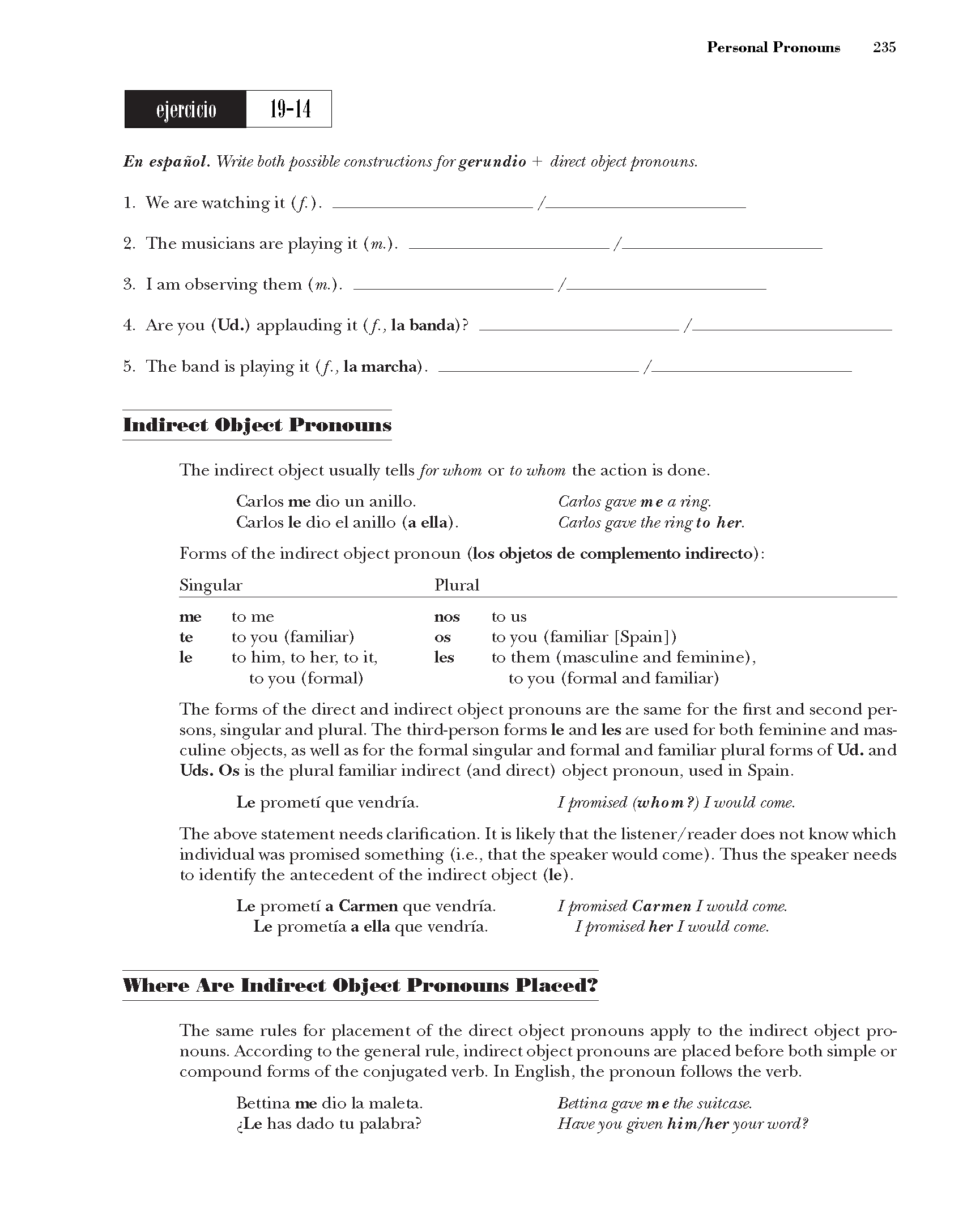CSG246

Personal Pronouns
235
ejercicio
En espańol. Write both possible constructions for gerundio + direct object pronouns.
1. We are watching it (f). _/_
2. The musicians are playing it (m.). _/_
3. I am obserang them {m.). _/_
4. Are you (Ud.) applauding it (/., la banda)? _/.
5. The band is playing it (/., la marcha). _/_
Indirect Object Pronouns
The indirect object usually tells for whom or to whom the action is done.
Carlos me dio un anillo. Carlos gave me a ńng.
Carlos le dio el anillo (a ella). Carlos gave the ńng to her.
Forms of the indirect object pronoun (los objetos de complemento indirecto) :
Singular Plural
|
me |
to me |
nos |
to us |
|
te |
to you (familiar) |
os |
to you (familiar [Spain]) |
|
le |
to him, to her, to it, |
les |
to them (masculine and feminine), |
|
to you (formal) |
to you (formal and familiar) |
The forms of the direct and indirect object pronouns are the same for the first and second per-sons, singular and plural. The third-person forms le and les are used for both feminine and mas-culine objects, as well as for the formal singular and formal and familiar plural forms of Ud. and Uds. Os is the plural familiar indirect (and direct) object pronoun, used in Spain.
Le prometi que vendria. Ipromised (whom?) Iwould come.
The above statement needs clarification. It is likely that the listener/reader does not know which individual was promised something (i.e., that the speaker would come). Thus the speaker needs to identify the antecedent of the indirect object (le).
Le prometi a Carmen que vendria. Ipromised Carmen I would come.
Le prometia a ella que vendria. Ipromised her I would come.
Wliere Are Indirect Object Pronouns Placed?
The same rules for placement of the direct object pronouns apply to the indirect object pronouns. According to the generał rule, indirect object pronouns are placed before both simple or compound forms of the conjugated verb. In English, the pronoun follows the verb.
Bettina me dio la małe ta. <:Le has dado tu palabra?
Bettina gave me the suitcase.
Hcweyou given him/her your word?
Wyszukiwarka
Podobne podstrony:
CSG111 100 Complete Spanish Grammar ejercicio En espańol. Usa el verbo estar + el gerundio. 1.
CSG250 Personal Pronouns 239ejercicio Los intercambios. En espahol. Place thepronouns before the con
CSG315 304 Complete Spanish Grammar ejercicio En el banco. En espańol. Usa la persona Ud. 1. &
FOR STUDENTS
Scan0068 (12) 20b iOfrezco una calidad fantastica! Przeczytaj, co ma ci do zaoferowania „Casa Rafael
45030 kaczki stadko ALL AMERICAN BOYSInstrucciones en Espańol Explications en Franęais Deutsche
CSG181 170 Complete Spanish Grammar 15-11ejercicio Una campańa pubUcitaria. Termina la frase en espa
więcej podobnych podstron